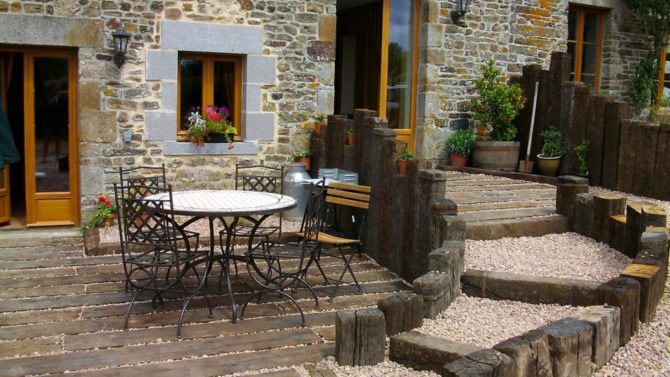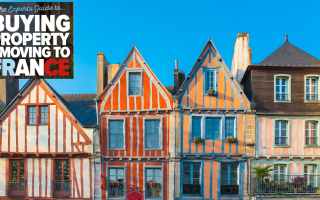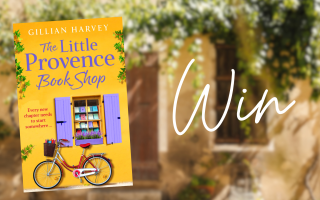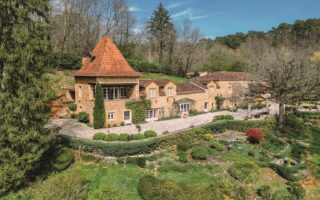Living the good life in Normandy

Is it easier to live an environmentally friendly life in France? A British family share how they live and run a business in a sustainable way in Normandy

It’s dinner time in the Normandy countryside and as a rack of home-reared pork cooks slowly in the oven, Rosie Hill crosses the flower-strewn garden to her vegetable patch and picks tonight’s greens of new potatoes, summer courgettes and sweet cabbage.
“It’s all gone in a few minutes but it’s so good knowing that it’s my own produce,” Rosie says. “Zero food miles were used to get it, I don’t use any chemicals, so it’s good for the environment and it’s good for my health, although my back might not say the same…”
Living off the fat of the land is not just a means of having a lovely way of life for Rosie, her husband Simon and their teenage sons, Tom and Ben; this back-to-basics approach is at the core of their eco-friendly gîte business that caters for green holidays in rural Calvados. For some visitors, the concept of a sustainable lifestyle is new but Rosie never knew anything else.
Why did you decide to live a sustainable lifestyle?
“I’ve always been an eco person,” Rosie explains. “And I’ve always been a gardener. My grandfather had a nursery and I used to follow him round – I probably drove him mad! I think being green is just in my blood.”
With such green-thumbed beginnings, it was perhaps no surprise that when Rosie and Simon started to think about starting up a holiday rental business, they went down the green route. “We thought it would give us a unique selling point,” Rosie explains.

_______________________________________________________________
Don’t miss
12 ways to live a sustainable lifestyle in France
What is it like to live in Normandy?
_______________________________________________________________

Why did you choose to live in Normandy?
Not only would their eco-ethos shape the property renovation, it would be a deciding factor in where they would base themselves, as Rosie explains: “We wanted to be close enough to England because we thought most of our customers would be coming from the UK and we thought it was a bit daft to come to an eco gîte if you’d hopped on a plane and flown a long way. Ferry travel is quite environmental and we’re only one hour from the ferry port so people aren’t using huge amounts of fuel.”
Gardening practicalities also meant that northern France was the most sensible choice. “The climate is similar to what it is in the UK so for me the gardening was the same. If I had of gone further south, it would have been a sharp learning curve in terms of how to garden in hot weather.”
How did you find your property?
With their location settled on, the family went on several house-hunting trips to France but, with two young boys, the search began to take its toll and so Simon went alone. “He rang me up one day and said ‘Quick, get on the ferry, I think I’ve found what we’re looking for’,” Rosie remembers. “It was an old stone hay barn with enough land to keep animals and suitable buildings that could be converted to host potential guests.”
_______________________________________________________________

Don’t miss
10 insider tips for successful househunting
Where to buy a bargain rural retreat in France
_______________________________________________________________
How did you make the property environmentally friendly?
But the hard work had only just begun, as the couple worked to make the accommodation fit with their vision. “We’ve tried to develop the gîte in the most environmentally friendly way,” Rosie explains. “It’s highly insulated so it stays warm in the winter and cool in the summer. We’ve even had guests staying in the winter who have had to open the door because it’s got so warm.”
Their environmental philosophy extended to decorating the gîtes, preferring to use environmentally friendly paints and salvaging as much second-hand material as they could. “We went to a lot of second-hand brocantes and when some friends were leaving, we took furniture that they couldn’t take with them.” An example is a set of antique beds that now feature in guest bedrooms. “They fitted perfectly. I could never have imagined that they would look so nice but it meant that we didn’t have to buy in new.”
Restricted to a budget, Rosie and Simon weren’t able to afford all of their dream features, such as solar panels to heat the water, and the expense of being thoroughly environmentally friendly is something that Rosie acknowledges is a potential barrier. “Money is a bit of an issue but I think there are more grants available for things like solar panels now so we will look into that for the future.”
Yet despite all the costly efforts that the couple have made to make the home as kind to planet Earth as possible, it is Rosie and Simon’s love of life and want to make a difference that really goes a long way. “We want people to relax and have a good time,” enthuses Rosie. “If people are relaxed and happy, that’s good for the environment. If they’re stressed they’ll make silly decisions, grab something off the shelf and not stop to think where it comes from. Here, they can walk to the market and buy fresh fruit and vegetables that are locally grown and spend time cooking and enjoying time together. You see people’s shoulders relax and you just think, ‘yes!’”
Is it easier to live in a more environmentally friendly way in rural France?
“The French do lead a more local life,” Rosie admits. “They tend to shop locally and support local businesses and restaurants. I was at the market yesterday and it was heaving. Also, you’ll notice that lots of people still garden here. Even those that live in town and only have a small garden patch will still have some potatoes or a few leeks and some tomato plants, and a lot of people keep chickens.” Life in the countryside sounds very idyllic, if not a little remote, but Rosie says their location is ideal for both them and their guests.
“It’s very rural here but we’re still close to all the amenities and tourist things for guests. Mont St-Michel is close-by and the coast is an hour’s drive, but it’s a beautiful journey through the countryside so people enjoy doing it.”
_______________________________________________________________
Don’t miss
How we built our own eco-house in Normandy
Expats running an eco-friendly B&B in Picardy
_______________________________________________________________
Do your children have a better life in France?
This lovely way of life is certainly one Rosie and her husband Simon, along with their two boys Tom and Ben, have enjoyed since they moved, and Rosie talks charmingly about the boys’ “lovely childhood, running through fields”. The carefree existence is a luxury that many young families hope to find at the gîtes and Rosie and Simon are more than happy to share it with them, embracing the opportunity to make cosmopolitan connections with their guests that come from all over the world.
“Some people arrive and are very quiet and others are more chatty, and we’ll quite happily sit and enjoy a glass of wine with them. We’ve made some great friends, one family in particular who we see every time we go back to the UK,” says Rosie.
But perhaps the real star of the show is the family’s pet boar, named Boris Johnson. “He’s a gentle giant,” laughs Rosie. “He’s a lovely attraction and the kids especially always seem to remember him.”
Do you hope that staying here inspires people when they return home?
But beyond making memories, Rosie and Simon are keen that staying at the gîtes will promote a more environmental lifestyle, and whether that’s through providing guests with re-usable shopping bags, encouraging them to use the on-site recycling and composting facilities or showing the kids around the wildlife holding, there’s a hope that guests will remember their time in Normandy when they go back home.
“I would love to think that they take something like that away with them,” says Rosie. “I just try to set that idea, that little spark. If you tell people all the things they should do to make the world perfect, they’re not going to do it. But if they make little changes, like walking to school one day a week or buying one pack of organic meat a month, then you gradually have a greater influence” she says. But for those who need more motivation to go green, it would surely be Rosie’s reasoning as she pops those seasonal greens in the pan: “It’s just all about having a lovely life.”
Like this? You might enjoy:
Living green in Tarn-et-Garonne
Share to: Facebook Twitter LinkedIn Email


